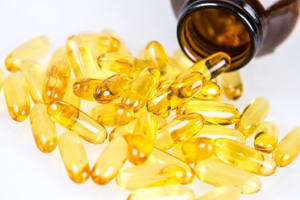- Home
- Editorial
- News
- Practice Guidelines
- Anesthesiology Guidelines
- Cancer Guidelines
- Cardiac Sciences Guidelines
- Critical Care Guidelines
- Dentistry Guidelines
- Dermatology Guidelines
- Diabetes and Endo Guidelines
- Diagnostics Guidelines
- ENT Guidelines
- Featured Practice Guidelines
- Gastroenterology Guidelines
- Geriatrics Guidelines
- Medicine Guidelines
- Nephrology Guidelines
- Neurosciences Guidelines
- Obs and Gynae Guidelines
- Ophthalmology Guidelines
- Orthopaedics Guidelines
- Paediatrics Guidelines
- Psychiatry Guidelines
- Pulmonology Guidelines
- Radiology Guidelines
- Surgery Guidelines
- Urology Guidelines
Omega 3s accelerate effect of antidepressants in major depression, emphasizes new Guideline

The International Society for Nutritional Psychiatry Research (ISNPR) has released clinical practice guideline on whether omega-3 polyunsaturated fatty acids (PUFAs) plays a role in the treatment of major depressive disorder (MDD). The guideline is published in the Psychotherapy and Psychosomatics journal.
The major recommendation of the guideline is -- omega-3 polyunsaturated fatty acids should be used as an adjunctive therapy for major depressive disorder.
Fish oils are rich in Omega-3 fatty acids, specifically eicosapentaenoic acid (EPA) and docosahexaenoic acid (DHA). Although our bodies can turn alpha-linoleic acid—another type of Omega-3 fatty acid found in things like canola oil, pumpkin seeds, and walnuts—into EPA and DHA, fish oil is one of the most efficient sources of this two Omega 3s for us.
Major depressive disorder (MDD) affects one-tenth of the population and has been the world’s leading cause of disability. MDD is of heterogeneous etiology with multiple contributory biological mechanisms. Pharmacological treatments with the currently available antidepressants, although proven to be effective in treating moderate to severe symptoms in MDD, have only modest effect sizes but various adverse effects. Therefore, to optimize the patients’ outcomes, clinicians need more efficacious and tolerable treatments supported by valid scientific evidence and reliable practice guideline
Key recommendations include:
- Clinicians who use n-3 PUFAs in the treatment of MDD should do so only after applying a clinical interview to confirm the diagnosis and assess the mental status and relevant medical conditions including fish hypersensitivities.
- n-3 PUFAs are better used as adjunctive therapy than monotherapy for MDD treatment.
- n-3 PUFAs can be both safe and efficacious, both for augmentation and acceleration. Acceleration is adding n-3 at the beginning of the treatment wi8th another antidepressant. Augmentation is adding n-3 when a prior antidepressant's effect is inadequate.
- Both pure EPA (eicosapentaenoic acid) and EPA-DHA (docosahexaenoic acid) (ratio > 2:1) combinations are effective as a potential treatment for MDD.
- n-3 PUFAs are considered effective as an adjunctive treatment for acute major depressive episodes, but more evidence is needed for recurrent major depressive episodes.
- The recommended therapeutic dosages should aim for 1-2 g/day of total EPA from pure EPA or 1-2 g/day from an EPA-DHA (> 2:1 combination).
- The dose is recommended to increase in 2 weeks for n-n or partial responders and titrated up to a maximum dose in 4-6 weeks if tolerable.
- For non-responders, it is recommended to evaluate the quality of n-3 PUFA supplementary products.
- n-3 PUFAs could be recommended as a potential prophylactic treatment for high-risk population (alongside standard medical care).
- The duration of acute n-3 PUFA treatment could be extended to include maintenance treatment to potentially prevent a recurrence.
- Potential side effects, such as gastrointestinal and dermatologic conditions, should be monitored, and comprehensive metabolic panels should be obtained during treatment.
- n-3 PUFAs could be prescribed for MDD patients who are overweight (BMI > 25) and/or have elevated levels of inflammatory markers; they may also have a role in women with perinatal MDD, and elderly and children and adolescents with MDD.
"To conclude, the ISNPR provides the first practice guideline of n–3 PUFAs in depression treatment and emphasizes the importance of accurate clinical diagnosis and measurement-based psychopathological assessments practised in the therapeutic settings. Pure EPA or a combination of EPA and DHA (with net EPA starting from at least 1 up to 2 g/day) for at least 8 weeks are recommended as an adjunctive treatment. Monitoring of adverse effects is recommended. In MDD patients with different medical comorbidities, during the perinatal period, or for primary prevention of MDD in specialized populations, there were promising results with good tolerability profiles, but well-designed RCTs with larger sample sizes and longer duration are needed to confirm the efficacy of n–3 PUFAs," wrote the authors.
To read the complete guideline follow the link: https://doi.org/10.1159/000502652

Disclaimer: This site is primarily intended for healthcare professionals. Any content/information on this website does not replace the advice of medical and/or health professionals and should not be construed as medical/diagnostic advice/endorsement or prescription. Use of this site is subject to our terms of use, privacy policy, advertisement policy. © 2020 Minerva Medical Treatment Pvt Ltd